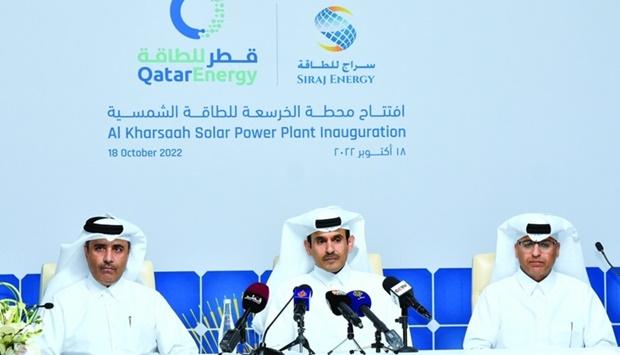Another 800MW will be added to Qatar’s national grid with the completion of two more solar plants being set up at Ras Laffan and Mesaieed by QatarEnergy, said HE the Minister of State for Energy Affairs, Saad bin Sherida al-Kaabi.
The solar plants at Ras Laffan and Mesaieed will be inaugurated in 2024, al-Kaabi told a media event at Al Kharsaah Tuesday.
The minister said the Al Kharsaah project represents a milestone in Qatar’s energy history and is set to meet 10% of its peak electricity demand at full capacity and reduce CO2 emissions by 26mn metric tonnes over its lifespan.
It is also a major step towards Qatar’s goal of achieving production of 5GW of solar power by 2035.
Al Kharsaah Solar PV Independent Power Producer (IPP) Project is the country’s first large-scale solar power plant and is set to significantly reduce the environmental footprint.
The Al Kharsaah Solar PV Power Plant is owned by a joint venture between affiliates of QatarEnergy Renewable Solutions (60%), Marubeni (20.4%) and TotalEnergies (19.6%).
“The site of Al Kharsaah was chosen following extensive scientific studies to determine the sites with the best possible operational efficiency and maximum economic value, placing great consideration to the geological, environmental, and social impacts of establishing this station,” HE al-Kaabi said.
Building the plant, HE al-Kaabi said, comes as part of implementing QatarEnergy’s updated Sustainability Strategy, which reemphasises its commitment, as a major energy producer, to the responsible production of clean and affordable energy to facilitate the energy transition.
In addition to increasing solar capacity to over 5GW, the strategy targets reducing greenhouse gas emissions, and deploying carbon capture and storage technology to capture over 11mn tonnes per year of CO2 in Qatar by 2035.
It also aims to further reduce the carbon intensity of LNG facilities bolstering Qatar’s commitment to responsibly supply cleaner LNG at scale in support of the energy transition
In reply to a question on Qatar’s LNG contracts and cargoes, HE al-Kaabi said, "Qatar is absolutely committed to the sanctity of contracts. To us, this is something that is absolutely fundamental to doing business. This is how we have done business in the past…and this is how we will be doing our business in future.
“So when we sign with an Asian buyer or European buyers, we stick to that agreement. And that is why for more than 27 years, we have not missed a single cargo of LNG and are trusted by our partners and buyers around the world.
"So the volume that will go to Europe is what has been assigned. As far as taking from Asian buyers to take to Europe (that) will not happen."
He also said QatarEnergy aims to become the world's biggest LNG trader through organic growth and is already building trading teams, HE al-Kaabi said. "We are just going to keep building that organically. So we are not looking at acquiring a company or anything like that,” HE al-Kaabi noted.
The solar plants at Ras Laffan and Mesaieed will be inaugurated in 2024, al-Kaabi told a media event at Al Kharsaah Tuesday.
The minister said the Al Kharsaah project represents a milestone in Qatar’s energy history and is set to meet 10% of its peak electricity demand at full capacity and reduce CO2 emissions by 26mn metric tonnes over its lifespan.
It is also a major step towards Qatar’s goal of achieving production of 5GW of solar power by 2035.
Al Kharsaah Solar PV Independent Power Producer (IPP) Project is the country’s first large-scale solar power plant and is set to significantly reduce the environmental footprint.
The Al Kharsaah Solar PV Power Plant is owned by a joint venture between affiliates of QatarEnergy Renewable Solutions (60%), Marubeni (20.4%) and TotalEnergies (19.6%).
“The site of Al Kharsaah was chosen following extensive scientific studies to determine the sites with the best possible operational efficiency and maximum economic value, placing great consideration to the geological, environmental, and social impacts of establishing this station,” HE al-Kaabi said.
Building the plant, HE al-Kaabi said, comes as part of implementing QatarEnergy’s updated Sustainability Strategy, which reemphasises its commitment, as a major energy producer, to the responsible production of clean and affordable energy to facilitate the energy transition.
In addition to increasing solar capacity to over 5GW, the strategy targets reducing greenhouse gas emissions, and deploying carbon capture and storage technology to capture over 11mn tonnes per year of CO2 in Qatar by 2035.
It also aims to further reduce the carbon intensity of LNG facilities bolstering Qatar’s commitment to responsibly supply cleaner LNG at scale in support of the energy transition
In reply to a question on Qatar’s LNG contracts and cargoes, HE al-Kaabi said, "Qatar is absolutely committed to the sanctity of contracts. To us, this is something that is absolutely fundamental to doing business. This is how we have done business in the past…and this is how we will be doing our business in future.
“So when we sign with an Asian buyer or European buyers, we stick to that agreement. And that is why for more than 27 years, we have not missed a single cargo of LNG and are trusted by our partners and buyers around the world.
"So the volume that will go to Europe is what has been assigned. As far as taking from Asian buyers to take to Europe (that) will not happen."
He also said QatarEnergy aims to become the world's biggest LNG trader through organic growth and is already building trading teams, HE al-Kaabi said. "We are just going to keep building that organically. So we are not looking at acquiring a company or anything like that,” HE al-Kaabi noted.


